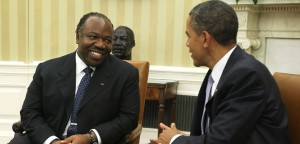Fleets of luxury vehicles, crates of expensive Champagne, a $500 million presidential palace, specially designed platform shoes, and dozens of homes in Paris alone: Omar Bongo Ondimba didn’t just rule the oil-rich central African nation of Gabon with an iron fist for more than four decades. He did it in style.
When he died from unexpected cardiac failure in 2009 at the age of 73, he left behind a wife, two ex-wives (one of whom became a successful pop singer after their divorce), more than 50 children, and 1.5 million citizens in a nation his supporters say he essentially built from scratch.
 Omar Bongo took over Gabon’s presidency in 1967, seven years after the small nation liberated itself from France. It was little surprise that one of his sons, Ali, won the same seat three months after his father’s death. Yet Ali Bongo Ondimba still denies — despite a contested 2009 election — his father’s legacy helped put him in power.
Omar Bongo took over Gabon’s presidency in 1967, seven years after the small nation liberated itself from France. It was little surprise that one of his sons, Ali, won the same seat three months after his father’s death. Yet Ali Bongo Ondimba still denies — despite a contested 2009 election — his father’s legacy helped put him in power.
“My father used to say I would inherit his house but not his seat,” Bongo told Foreign Policy during an exclusive March 31 conversation at the Atlantic Council think tank in Washington, adding that his father’s legacy “was more of a burden than an advantage” during his 2009 campaign.
A self-proclaimed reformist, the younger Bongo visited Washington for last week’s annual Nuclear Security Summit. There is hardly a viable opposition in Gabon, and Bongo is favored to win another seven-year mandate in an August vote. Bongo’s father is widely understood to have used the country’s oil wealth for enormous personal gain. But when asked whether he thought it might be time for the Bongo family to step down, the central African nation’s 57-year-old current leader practically scoffed.
“I am bringing change,” Bongo said repeatedly. “Who am I facing? Old politicians. They were the ones who were having responsibility at the time of my father. I am bringing change.”
As it turns out, keeping the younger Bongo in power might be in Washington’s best interest.
Over the past seven years, Gabon has quietly solidified its role as an easy diplomatic ally to the United States in a region rocked by instability. Its relationship with the Obama administration was strengthened when Gabon rotated into a temporary role on the United Nations Security Council from 2010 to 2011. During that time, the Obama administration was desperate for UNSC members to support an intervention in Libya to oust dictator Muammar al-Qaddafi from power.
Bongo’s government pulled through: In February and March 2011, Gabon voted in favor of two Security Council resolutions, one that imposed sanctions on Qaddafi and another that established a no-fly zone over Libya. On a visit to Washington in June that year, Bongo became the first African leader to publicly call for Qaddafi to step down. He was also the first African leader during Obama’s administration to stay at Blair House, the American president’s private guest residence. And in 2014, he and his wife, Sylvia, were seated at the head table with Obama and his wife, Michelle, at a state dinner during the African Leaders Summit in Washington.
“There’s been a slow but steady build-up of the relationship that’s largely gone unremarked,” said J. Peter Pham, director of the Africa Center at the Atlantic Council. “Whereas the other countries on the UNSC were more reserved, Gabon led the way and helped the administration get the African vote for the resolutions to intervene in Libya.”
Eric Benjaminson, who served as U.S. ambassador to Gabon from 2010 to 2013, told FP the Libya intervention proved Libreville’s strategic importance in Africa. He said Bongo’s ability to influence other African leaders was helped, in large part, by Gabonese government officials who had worked for his father before they worked for him.
“They had Rolodexes that were amazing,” Benjaminson said. They could call any African leader with private cell numbers. They knew Qaddafi and they knew his chief of staff very well, and we were trying to work through the Gabonese to get Qaddafi to step down without military action.”
Ultimately, that didn’t work. But Benjaminson said throughout the intervention, Bongo’s administration offered Obama a remarkable amount of information about talks it was having with other African leaders behind the scenes, even if the White House was not organizing or leading those diplomatic efforts. Gabonese officials would check with the United States to see if their decisions “fit into the framework of what the other Western UNSC members were doing, and we would tell them and they would modify things often,” Benjaminson said.
Benjaminson accompanied Bongo on his trip to Washington in 2011 and said from what he could see, “Obama sort of liked him.”
“The guy’s an interesting raconteur, he’s a friendly African, and it’s not Obama’s home so it doesn’t look like he’s coddling up to a country that his ancestors came from,” he said, referencing Kenya, the birthplace of Obama’s father. “It was a nice thing.”
Read more: Meet Ali Bongo Ondimba, Obama’s Man in Africa
Source:FP


